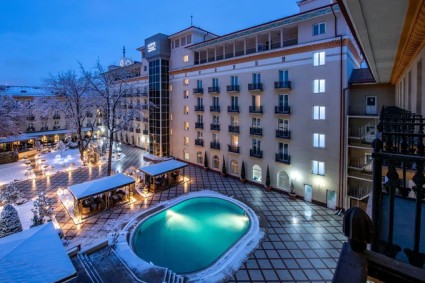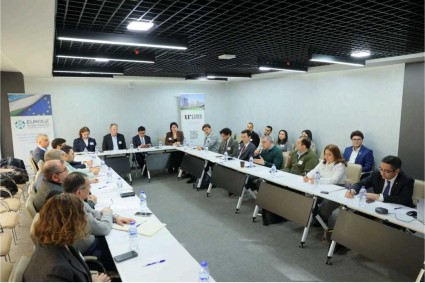After a quarter-century under Islam Karimov, whose repressive rule brought a strong measure of economic isolation, Uzbekistan is taking steps to open its economy to foreign investment, the Radio Liberty said.
The latest step took senior officials of the Central Asian country to New York City, where they outlined their economic reform agenda to some of the biggest names on Wall Street at a private Manhattan club.
The daylong event at the Penn Club on July 22 featured Uzbekistan's foreign minister, deputy Senate chairman, and head of capital markets pitching to investment professionals from firms including Citibank, Franklin Templeton, and Goldman Sachs, people.
It is an image that would have been inconceivable just three years ago.
During the 27-year rule of President Islam Karimov, which ended with his death in 2016, Uzbekistan was considered one of the world's most repressive and closed states as the autocrat jailed political opponents, institutionalized child labor, and largely kept out foreign investment.
His policies were at least partly to blame for slow economic growth and a dearth of jobs that paid a living wage, driving millions of Uzbek citizens to seek temporary work in Russia, Kazakhstan, and other former Soviet states.
Karimov's counterpart in Kazakhstan, former President Nursultan Nazarbaev, harnessed that nation's richer natural resources to attract tens of billions of dollars in foreign investment. Kazakhstan is Central Asia's biggest economy by far, despite having about half the population of Uzbekistan.
Now Karimov's successor, Shavkat Mirziyoev, is making efforts to open Uzbekistan to the world, taking a page from Kazakhstan's growth model. Some fear he will also replicate his neighbor's authoritarian style of government -- or do little to change his own predecessor's oppressive rule -- instead of pushing ahead simultaneously with major political reforms.
The 62-year-old former prime minister has ended currency controls, lifted some trade barriers, brought in young technocrats to replace Soviet-era officials, and promoted his country's investment potential abroad.
Nascent Markets
Earlier this year Mirziyoev signed a decree to privatize dozens of state-owned companies -- decades after Russia and Ukraine sold off many of their former Soviet enterprises -- a move that could attract not only much-needed money into outdated state enterprises, but expertise as well.
"These are really dramatic, revolutionary changes for Uzbekistan," Thomas Firestone, a partner at the law firm Baker McKenzie, who was speaking on behalf of Uzbekistan, told a group of U.S. officials and executives last week at the Uzbek Embassy in Washington, where the nation kicked off its U.S. public relations offensive.
However, before Mirziyoev's government can push ahead with privatizations and help local companies raise financing, it must develop the nation's nascent capital markets and familiarize potential investors with a country that for many is halfway around the world -- and still little-known nearly three decades after the Soviet Union fell apart.
The July 22 meeting with investors in Manhattan -- the first of its kind for Uzbekistan -- aimed to do just that.
Executives of more than 10 Uzbek companies, including banks and energy companies, delivered presentations to a standing-room-only crowd of about 130 Wall Street investment professionals, said Alisher Djumanov, a wealth manager who attended the event.
Atabek Nazirov, the director of Uzbekistan's recently created Capital Markets Development Agency, updated the Wall Street community about reform of the nation's local stock and bond market as well as upcoming privatizations.
Nazirov, a former Goldman Sachs banker in New York, was invited by Mirziyoev's government to return to his native Uzbekistan to help develop the country's market laws. Nazirov said he wants to replicate the laws he operated under while working on Wall Street.
"I will be tempted to try to imitate this model and bring as much best practices to Uzbekistan as possible," he said last week at the embassy event in Washington, referring to U.S. legislation enforced by the Securities and Exchange Commission.
The investor meetings are important because they give Uzbek officials the opportunity to get critical feedback on their reform plans and to form realistic expectations on how much they can attract at this stage, said Djumanov.
"It takes time for investors to become comfortable with the reforms taking place," he said.
Attractive Investment Destination?
Investment professionals have pointed out that Uzbekistan should learn from the mistakes made by other former Soviet republics during their privatization programs.
J.P. Natkin, a partner at Eurasia-focused consultant firm Macro-Advisory, told the U.S. officials and executives at the embassy event that Russia left its emerging capital markets open to abuse by privatizing in the 1990s, before it had strong securities laws in place.
Uzbekistan could be an attractive investment destination for U.S. investors and companies because it has a large, young, and growing population, substantial natural resources such as gas and gold, and straddles the so-called Silk Road between China and Europe. At about 33 million, its population is the third-largest among former Soviet republics and the largest in Central Asia.
One of the biggest problems facing the country's bid to attract investment and build its capital markets is a lack of qualified professionals. Though Uzbekistan is attracting some experienced expats like Nazirov and Djumanov, who relocated to Tashkent last year from the United States, it needs a lot more, said Alexander Cooley, director of Columbia University's Harriman Institute and an expert on Central Asia.
"They want to implement all these reforms, but do they have the legal expertise, the technical capacity? It is not clear," he told RFE/RL.
Kazakhstan has minimized that dilemma by creating the Bolashak program, which has paid for more than 10,000 Kazakh college graduates to study abroad, creating a deep pool of professionals, said Cooley. Graduates accepted into the Bolashak program must come back to serve their country for five years.
A similar project in Uzbekistan called Umid never achieved that scale, and the country is now forced to tap its diaspora abroad. It won't be an easy sell: Uzbek companies are unlikely to be able to pay the salaries those expats can earn working on Wall Street or in other financial centers.
And while money is an issue in attracting Uzbeks back home, it is not the only one. The lack of a clear career path and -- perhaps more importantly -- confidence the reforms won't stall or be reversed are also keeping Uzbeks from leaving their adopted countries.
"They are people that tried to escape from the lack of opportunities in Uzbekistan. So they really want to see the evidence that these changes are irreversible," said Djumanov, adding he is confident the numbers will increase with each passing year.
So, there are plenty of eyes on Mirziyoev's next steps. While he is making serious efforts to open his nation's economy and bring more professional people into the government, there are no clear signs he is willing to open its political sphere as well, analysts said.
Three years into his reign, Uzbekistan still has neither genuine opposition parties nor an independent legislature or judiciary. He has also placed family members in important government positions.
His son-in-law Otabek Shakhanov is the head of the presidential security service, which has considerable influence, while his daughter Saida was named deputy head of the newly established presidential agency that oversees communications and media regulation.
And though Mirziyoev has freed thousands of religious prisoners, allowed some nongovernment organizations and media back into the country, and curtailed child labor, his government has launched a village revival program that critics say forces citizens to work for free.
The United States and the European Union must be cautious not to overstate the progress Uzbekistan is making on the economy, said Cooley.
"By global standards, it's still authoritarian -- it is just trying to open itself a bit more to economic, legal, and social influences," he said.














